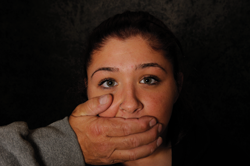The presence of rape and sexual assault on college campuses, ways to prevent this behavior, and places to seek help both on and off campus has been a topic of recent discussion at the University.
“Rape is not only a crime, it is a crisis,” said Ellen Bloom-Rau, Crisis Counselor and University alumna. Bloom-Rau has been visiting the University for 12 years to discuss the topic of sexual violence.
Bloom-Rau spoke at the University during “Hawks United Week,” an event which focused on sexual violence prevention. She stressed the difference between sexual assault and sexual contact. Sexual assault is defined as, “Unwanted sexual penetration of another person. This can be vaginal, oral, or anal.” The counselor defined sexual contact as, “Any unwanted sexual contact without penetration.”
Nina Anderson, Title IX Coordinator at the University, has been a major contributor to the discussion of sexual assault on college campuses. “Our goal was to present information on campus sexual assault in several formats to educate and increase awareness in the campus community on this very complex issue,” she said.
“One in four college women are or will be victims of rape or attempted rape,” said Bloom-Rau. The counselor discussed the fact that many groups of people are at risk, but that 95 percent of the victims are women. “If you think as a woman you will not encounter this, you are wrong,” said Bloom-Rau.
Sexual violence is present at the University. “In 2013 we had five reported sexual assaults. Two resulted in arrests,” said William McElrath, Chief of Monmouth University Police Department (MUPD). “In two cases the victims chose not to pursue. In the fifth case, the victim reported the assault to university officials but not to the police,” McElrath reported.
Awareness is important to preventing sexual violence on college campuses. “What the university is doing is creating awareness for victims,” explained Audrey Williamson, instructor of political science and sociology. “Some people don’t realize what assault is, awareness of what it means to assault someone is vital to preventing sexual violence,” Williamson continued.
Often, perpetrators do not fully understand the definition of sexual consent. Bloom-Rau believes that this is due to a lack of education regarding this definition. “Consent is defined as the voluntary agreement of sexual activity. Submission is never consent,” clarified Bloom-Rau.
Alcohol is regarded as one of the contributors to the frequency of sexual assault and rape on college campuses. Bloom-Rau maintains that offenders often seek out victims who are defenseless and drinking alcohol makes a woman vulnerable. “When under the influence of alcohol, it is difficult to consent to sex. Seventy-two percent of college rape victims said they were too drunk to consent,” said Bloom-Rau. “If one of you is incapacitated, drunk, on drugs, or feels scared or forced, the consent you give or get doesn’t count,” she continued.
“College is a time when young adults are often in limbo between having teenage responsibilities combined with adult freedom, ” said Melanie Brima, a sophomore social work major minoring in psychology. “Young adults are more likely to let down their
barriers and become more ambitious with social endeavors. Combined with alcohol, this kind of behavior could be toxic,” she feels.
Bystander intervention was also discussed. Anderson defined the term as, “The concept of if you see something that does not seem quite right, step in to prevent something bad from happening.”
Bloom-Rau explained that students should be more aware of this term and need to implement it into their everyday lives. “If you see your friend is intoxicated, you need to step in. We are asking you to say something and act,” she urged.
There are various lasting psychological effects that survivors of sexual assault and rape often encounter. “Survivors feel they have no control,” said Dr. Franca Mancini, Director of Counseling and Psychological Services at the University. “Rape is about power and control. Victims face the ultimate form of this lack of control,” Mancini explained.
Mancini said that effects vary depending on the individual, but could include shock, disbelief, depression, anxiety, post-traumatic stress disorder (PTSD), and a lack of
motivation. She explained that it is often hard for survivors to get close to someone after they have faced sexual violence.
“I would encourage any student who has faced sexual assault or violence to get help,” said Anderson. She stressed that there are both on and off campus outlets available for victims. On campus resources include Health Services, Counseling and
Psychological Services, Student Life, Monmouth University Police Department, and the Office of Equity and Diversity.
Off campus resources are also available to victims and include 180 Turning Lives Around, which is an organization that is dedicated to ending domestic and sexual violence, and local hospitals including Monmouth Medical Center. “The most important message is to get help and support,” urged Anderson.
There is hope for students recovering from sexual violence. Mancini explained that in order to recover an individual needs to, “Reestablish their world, they need to stop being the victim and take back the things that have been disrupted. They need to go back to their regular schedule, go back to class, and start to think clearly.” Mancini said that it is a process to recover and that it takes time, but that there is hope for victims.
PHOTO COURTESY of Tara Cirincione



